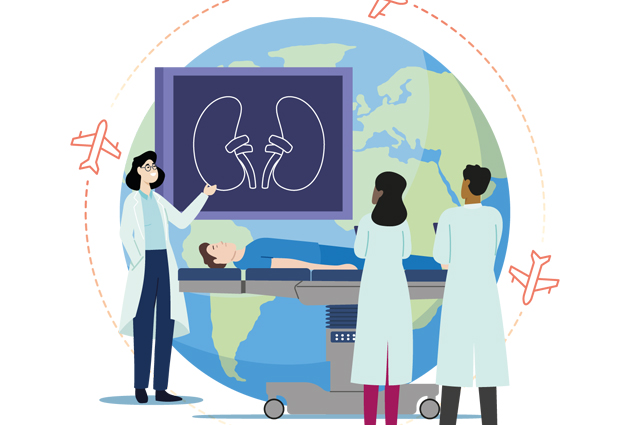“The Data Supports Transplanting People With Caution and With Thought”: Cancer Diagnosis and Kidney Transplants – A Summary of the ISN Middle East Regional Board – ASON Webinar
In this joint ISN Middle East Regional Board-American Association of Onconephrology (ASON) webinar, “Should We Perform Kidney Transplants in Recipients With a Pretransplant Cancer Diagnosis?” Professor Horacio Adrogue (USA) discussed the escalating demand for kidney transplants, particularly among individuals with prior cancer histories.
ISN-ASON partnership to advance onconephrology
The webinar was produced as part of the ISN’s close collaboration with ASON to deliver educational content and foster awareness in the onconephrology field.
Join/renew your ISN membership to access this webinar and other extensive educational resources available at the ISN Academy.
Regional perspective: rising cancer burden in the Middle East
Professor Adrogue provided an extensive overview of cancer statistics, the challenges faced in accurately reporting all cancer cases, and the mounting cancer burden in the Middle East, North Africa, and Turkey. It is projected that this region will witness a 60% surge in cancer cases in the coming decades. He commented, “In the Middle East, where the population is still young, there is a coming wave of cancer as your population ages.”
Professor Adrogue answers questions during the webinar
Optimism for patients with cancer history
He emphasized the necessity for personalized patient care, offering optimism for patients with a cancer history by affirming that organ transplants can be a safe option. According to Professor Adrogue, even with a history of two prior cancers, transplanted patients can still look forward to a relatively good life expectancy. He stated, “We have to act on the data we have. And I think the data supports transplanting people with caution and with thought.”
Cancer screening: Recommendations and the importance of family history
Professor Adrogue outlined recommendations for cancer screening, including methods, age groups, and other variables to consider for skin, colorectal, breast, cervical, prostate and lung cancers.
He stressed the need to consider the patient’s specific family history, stating: “Family, work, and recreational history are key to risk stratification for your patient in your country, in your city, in your town, and in your community. If you spend the time to get to know your patients and know what they’re at risk for, you will save a lot of trouble on the back end.”
Clinical scenarios: assessing transplant appropriateness
He suggested that age should not serve as the sole criteria for transplant eligibility and advised transplant centers to create data-driven plans and approaches to better support and care for people who have survived cancer.
Professor Adrogue presented a series of clinical scenarios involving patients with varying cancer histories and assessed the appropriateness of kidney transplantation for them, as well as the different waiting times between cancer treatment and transplant.
Multidisciplinary approach: A case study in AL amyloidosis
The webinar also covered the outcomes of renal transplantation in patients with AL amyloidosis with data on the incidence of pre-transplant cancer diagnoses among recipients of solid organ transplants. He presented a compelling case study of a patient who underwent a series of transplants to highlight the complexities and challenges encountered in managing AL amyloidosis and emphasize the pivotal roles of a multidisciplinary team and specialized care centers on favorable outcomes.
He stated, “If you have someone with AL amyloidosis, it is no longer a death sentence. Please don’t give up on them. Refer them to your tertiary center, or if they can come to Houston, we’d welcome them.”











